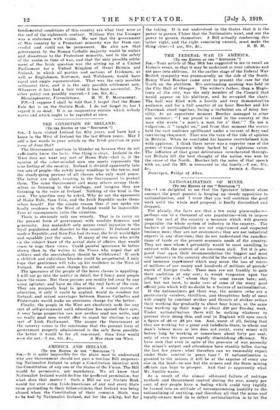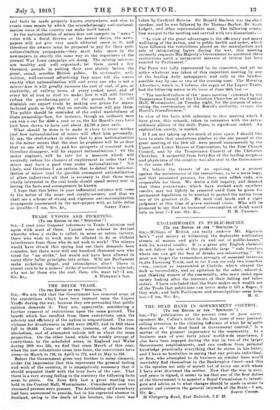NATIONALIZATION OF MINES.
(To THE EDITOR Or THE "SPECTATOR.")
am delighted to see that the Spectator (almost alone amongst the great papers) is keeping up steady opposition to nationalization, and I trust that you will continue the good. work -until the whole mad proposal is finally discredited and dropped.
Put plainly, the facts are that a few noisy place-seekersperhaps one in a thousand of our population—wish to impose upon the rest, of the country a measure which will gravely jeopardize the whole system of industry in the country. The backers of nationalization are not experienced and respected business men; they are not economists; they are not industrial experts in any direction; they do not understand the ramifications of trade or the present economic needs of the country. They are men n-hom I personally would be most unwilling to entrust with the control of an ice-cream stall. Yet it is proposed that upon their recommendation the biggest and most vital industry in the country should be the subject of a reckless and immense expeeiment which may mean the loss of scores of millions of our money and hundreds of millions of pounds' worth of foreign trade. These men are out frankly to gain their ambition at any cost; to wreak vengeance upon the alleged "idle rich" whom they for some reason hate; and, last but not least, to make sure -of some of the many good official jobs which will no doubt be a feature of nationalization.
If the nationalizers, get their way, the miners (who are a Particularly careless, thriftless, and thoughtless body of men) will simply by constant strikes and threats of strikes reduce their working day'gradually to about -four hours, at the same time working up their tvage to about .210 per five-day week. Under nationalization there will -be nothing whatever to prevent their doing this, and coal in England will soon .reach a figure of £6 or 18 per ton. And, worst of all, feeling that they are working for a great and indefinite. State, to whom one man's labour more or less does not count, every miner will. before long be working at somewhere about forty per cent. only of even his present rapidly diminishing efficiency. We have seen that even in spite of the pressure of war necessity the miner's output and attendance have steadily fallen during the last few .years : what therefore 'can we reasonably expect under State control in peace time ? If nationalization is granted to the miners it will be at the expense of every one else in the land—no one but the miners and the State mining officials can hope to prosper. And that is apparently what Mr. Smillie wants.
As a result of the almost •all-round failure. of red-tape methods and Government control during the war, ninety per cent, ofourpeople have a feeling which could very rapidly be turned into an attitude of uncompromising hostility -to tho nationalizing of anything, and therefore all that the mineand royalty-owners need do to defeat nationalization is to let the
real facts be made properly known everywhere, and also to create some means by which the overwhelmingly anti-national ization voice of the country can make itself heard. .
As the nationalization of mines does not compete in " news " value with a ducal divorce or the newest dance,. the newspapers will not give very much editorial space to it, and therefore the owners must be prepared to pay for their antinationalization propaganda—they must take space in the newspapers in exactly the same way as the organizers of the present War Loan campaign are doing. The mining interests are wealthy and well organized; let them spend a few thousand pounds in putting their case plainly before the great, sound, sensible British public. In systematic, wellwritten, well-reasoned advertising they must tell the voters exactly what nationalization will cost every one who is not a miner—how it will greatly increase the cost of coal, of gas, of electricity, of railway fares, of every cooked meal, and of every bit of iron or steel we make; how it will still further reduce the purchasing-power of the pound; how it will diminish our export trade by making our prices for manufactured goods so high that no outside nation will pay them. The public should be reminded of the awful wastefulness of State ownership—how, for instance, though an ordinary man can run a car for £500 a year or so, the Air Board's cars have just been shown to have cost about £2,700 a year each.
What should be done is to make it clear to every worker just how nationalization of mines will affect him personally. If, say, the steel-worker is shown that to give nationalization to the miner means that the steel he produces will be so dear that no one will buy it, and his prospects of constant work therefore disappear, will he support nationalization ? Or the motor engineer, will he vote for a measure which will assuredly reduce his chances of employment in order that the miner may have a good time under nationalization ? Not likely, and therefore I am certain that to defeat the nationalization of mines (and the possible consequent nationalization of other industries) all that is necesary is that those most vitally interested in the coal trade should spend money -now in letting the facts and consequences be known.
I hope that this letter in your influential columns will come to the notice of tile mineand royalty-owners, and that we shall see a scheme of strong and vigorous anti-nationalization propaganda commenced in the newspapers with as little delay
as possible.—I am, Sir,' &c., SAFBTY FIRST.















































 Previous page
Previous page